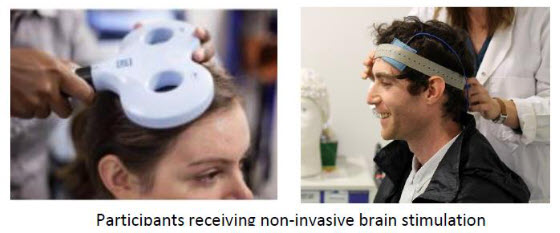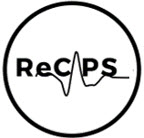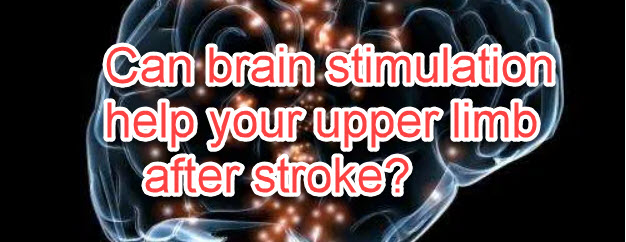Transcranial direct current stimulation (tDCS) uses a constant, low electrical current to stimulate a targeted region of your brain. This is performed via surface electrodes placed on the scalp.
 A note for ARNI blog readers: this kind of neuromodulation technology is mostly only accessible during in-patient or out-patient rehabilitation. Clinicians don’t encourage ‘do-it-yourself’ use of tDCS. Even if you find it possible to gain access to similar devices with the intention of applying the stimulation design of published studies, this is inadvisable and dangerous because improper use might cause harm.
A note for ARNI blog readers: this kind of neuromodulation technology is mostly only accessible during in-patient or out-patient rehabilitation. Clinicians don’t encourage ‘do-it-yourself’ use of tDCS. Even if you find it possible to gain access to similar devices with the intention of applying the stimulation design of published studies, this is inadvisable and dangerous because improper use might cause harm.
Clinically, there is moderate quality evidence of benefit on upper limb impairment, as compared to placebo or control, and there is high quality evidence that it’s not harmful. There exists strong evidence that it does not improve gait or balance when compared to sham stimulation.
Although tDCS could be provided for stroke patients (for example before or during upper limb task-practice to try to boost neuroplasticity, coupled with novel technologies like robot-assisted training), its added value to rehabilitation outcomes has been limited so far due to lack of adequately-powered research.
So, our colleagues at the Institute of Neurology, UCL have been exploring the issue of tDCS to improve the evidence for potential for improved upper limb outcomes via their ReCAPS Study.

ReCAPS: Re-opening the critical period for plasticity after stroke. This study is funded by Brain Research UK (BRUK).
(ReCAPS is a research study at the moment, not a clinical trial or free therapy).
This study has now re-opened with extensive COVID-safety measures in place.
OPEN TO RECRUITMENT! You may be able to take part if:
- You have experienced a stroke which affected the movement of your arm or hand.
- You have not experienced a stroke.

The UCL team wants to know:
- How brain activity changes after someone has a stroke.
- If weak, non-invasive brain stimulation could encourage the brain into a pattern of activity which is useful for upper limb rehabilitation.
You will need to have an MRI scan and attend 2 study sessions at the UCL institute of Neurology.
During sessions, you will watch a nature documentary while having very weak brain stimulation. Brain stimulation feels like a warm, tingling sensation on your head.
Please contact one of the team for more information:
Kirsten Thomas: kirsten.thomas.19@ucl.ac.uk
Jenny Lee: Jenny.lee@ucl.ac.uk
Carys Evans: Carys.evans@ucl.ac.uk
—————————————
Tel: 0203 4488 774




10 Comments
I suffered aria 05/11/2018 and have had no use of left arm hand since physic team have discharged me , but never worked with hand arm ever.left leg also affected but have limited use of that back, can now walk short distance with quad stick
Suzanne survived an ischemis stroke in March 2018 and has suffered with little movement to her right sided limbs. We have persevered with physiotherapy up until the lockdown which has set her back so much.
She would be incredibly interested in recieving more information on this treatment and is willing to try anything.
My Haemorrhagic stroke of several years ago affected my left hand and arm. making them useless. I would very much like to take part in your research programme.
David English 78 Sydney Road London N10 2RN 0208 444 6570
My Haemorrhagic stroke of several years ago affected my left hand and arm. making them useless. I would very much like to take part in your research programme.
David English 78 Sydney Road London N10 2RN 0208 444 6570
Would be very interested in helping with this research. Haemorrhagic stroke in Nov 2019 wiped out right side. No movement in hand or arm to date, but not for want of trying. willing to try anything and everything.
Haemorrhagic Stroke severely affected left side – no useful-movement in arm or hand.
Would be happy to participate in trials of possible treatments.
Hi had my stroke on the 17/09/2011 and where I had no movement I’ve constantly try different things to get movement on my stroke side. And yes I’ve been successfully have movement in my hand and fingers and can move my arm a lot more than when I came out of hospital. It’s a slow progress but it could be better and any help now would be much appreciated. Feel free to contact to myself.
I am 72 years of age. Two years ago I had a stroke. May I take tttake
had a stroke 5 years ago age 67 now little movement in left arm and hand would love to take part
Had a stroke 4 years ago. Aged 53. No movement in left hand or arm. Would love to try and get something back